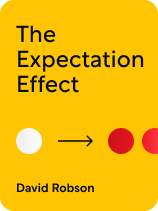

This article is an excerpt from the Shortform book guide to "The Expectation Effect" by David Robson. Shortform has the world's best summaries and analyses of books you should be reading.
Like this article? Sign up for a free trial here.
What is the expectancy effect? How do your expectations unconsciously come true?
In The Expectation Effect, David Robson argues that your brain, body, and environments conspire to create what researchers call expectancy effects. This means that what you expect to be or do becomes your reality.
Keep reading to learn more about this effect and how it plays a role in your life.
What Are Expectancy Effects?
An expectancy effect occurs when your beliefs exert an influence over your well-being, as when you take a pill for a headache and feel better not because of what’s in the pill but because you expect the pill to cure your headache. According to Robson, your body, brain, and the culture you live in create these effects, which are powerful and pervasive. In this section of the guide, we’ll explore how the brain’s perception process creates expectancy effects and how what we believe becomes our reality.
How Does Your Brain Construct Your Reality?
To understand how expectancy effects work, it helps to know that your brain doesn’t just perceive reality—it actively constructs it. Robson explains that as you perceive the world around you, your brain draws on information relayed by your senses as well as information inferred from your past experiences. In the process, your brain generates predictions about the sensory information it receives, like when you see a fly and your brain predicts its path so that you can swat it away from your face. The brain constructs a representation of what it thinks is happening and what it predicts will happen, and you perceive this representation as reality.
The brain relies heavily on these predictions. The visual cortex, the region of the brain that processes information received from the eyes, has extensive connections to other brain regions that make predictions—which illustrates how the brain is wired to rely on prior knowledge. Robson notes that it makes evolutionary sense for the brain to depend on predictions: Using predictions to inform perception reduces the amount of sensory information it has to process and enables it to focus on surprising sensory details, like the snake that you might just step on if your brain doesn’t alert you to get out of the way.
(Shortform note: Neuroscientists say that the brain makes predictions because it takes time for visual information to travel from the retina through the brain to the visual cortex in the back of the brain. If the brain didn’t compensate for the delay, information would be outdated by the time it’s processed. So the visual cortex relies on predictions to guess what’s happening before the sensory information arrives, collaborating with other areas of the brain such as the hippocampus to anticipate what will happen next. Scientists think that the brain operates this way because the world around us is ambiguous, and we have only so much processing power to make sense of it—so making predictions is a quick and efficient way to cope with those limitations.)
Robson points out that although the brain is good at making predictions, it can sometimes get tripped up. Your feelings and expectations can bias your brain’s predictions, like when you’re feeling nervous and your expectations about the situation make you think someone looks angry when they aren’t. Though perception feels objective, it’s not. As we’ll see in the next section, your body sometimes acts on your brain’s mistaken predictions, creating expectancy effects.
(Shortform note: Experts say that if you’re depressed, anxious, or irritable—or if you were exposed to violence or abuse as a child—you’re more likely to interpret someone else’s expression as hostile when it isn’t intended that way.)
How Do Your Beliefs Become Your Reality?
Expectancy effects come into play because when it comes to predictions about our own bodies and minds, our expectations exert such a strong influence that the brain makes them true. Robson explains that this often happens because the brain produces physiological changes throughout the body, like when you take an herbal remedy that might not reduce your aches and pains on its own, but works because your brain signals your body to reduce inflammation when you take it.
(Shortform note: Though the placebo effect is well-documented, scientists don’t always agree about how or why it works. Some researchers say that it’s unclear whether a placebo can really affect the physiological processes that cause an illness. But the placebo effect does seem to activate neurotransmitters in the brain that may help relieve symptoms.)
Our memories and beliefs aren’t the only sources of predictions that become reality. Robson notes that sometimes, our expectations come from the culture around us, for example, when we absorb the message that growing older means getting slower or weaker. If we believe this message strongly enough, the brain makes it our reality as we age.
(Shortform note: Negative cultural stereotypes about aging are everywhere. Researchers say that it’s important to cultivate optimism and self-efficacy, two traits that can help you look at your future in a positive way. Negative stereotypes can hurt your sense of self-efficacy, in particular, so maintaining a sense of agency can help you counter the expectations you internalize.)
What About Positive Thinking or the Law of Attraction?
Robson emphasizes that expectancy effects are not the same thing as positive thinking or the law of attraction, which he characterizes as “pseudoscience.” The law of attraction is the principle that positive thoughts can attract the things you want. By contrast, expectancy effects work via psychological and physiological mechanisms set in motion by the specific expectations we have about our bodies or minds.
(Shortform note: While expectancy effects only work under specific circumstances, Rhonda Byrne writes in The Secret that the law of attraction is infallible: It’s working all the time, picking up on the “thought messages” that you send out into the world. Critics say that the law of attraction has scant evidence to back it up, and some experts say that following it requires you to live in a state of mindlessness. Conversely, evidence suggests that mindfulness (the opposite of mindlessness) produces benefits for our health and well-being, as we’ll see in Robson’s explanation of expectancy effects that work because of the connection between our psychology and physiology.)

———End of Preview———
Like what you just read? Read the rest of the world's best book summary and analysis of David Robson's "The Expectation Effect" at Shortform.
Here's what you'll find in our full The Expectation Effect summary:
- Why you should rely on your body, not the universe, to make you happier
- How your brain can control your health, longevity, and quality of life
- Why you should focus on the benefits of getting older, rather than fearing it






